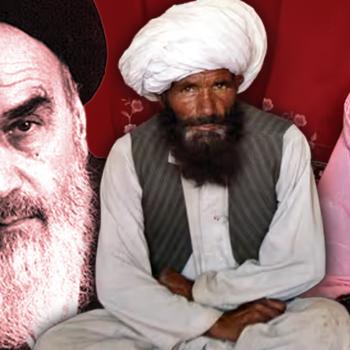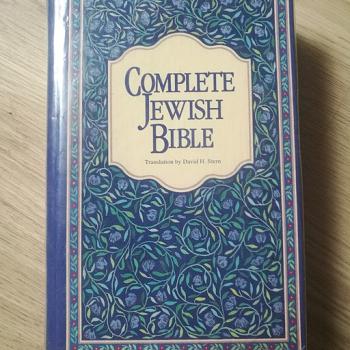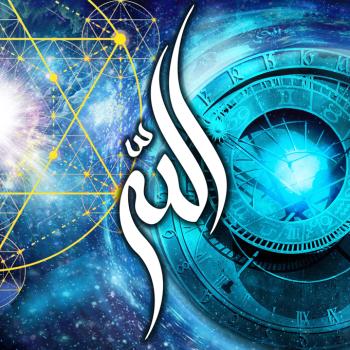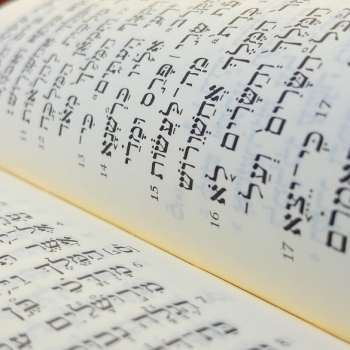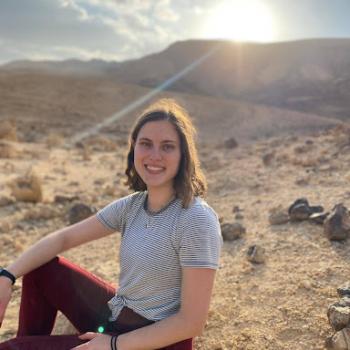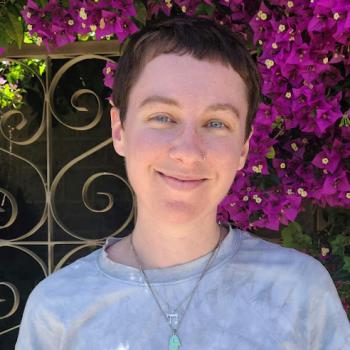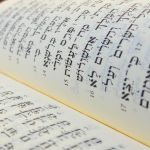By Rav Rachel Adelman ’21
Parashat Acharei Mot-Kedoshim Leviticus 16:1-18:30; Leviticus 19:1-20:27
These days I live in a double calendar. I am counting the 49 days of the Omer, seven times seven weeks, from the Exodus from Egypt to the moment of Revelation, when we received the Torah at Sinai. As I write, it is the 17th Day—two weeks and three days of the Omer. In my other calendar, I am counting every day from the 7th of October. Today is Day 572 of the War, which is 81 weeks and 5 days since the hostages were taken into Gaza. I do not count towards anything, but from.
In this, I resist tracing a narrative arc to history or memory. Rather, my counting is a resistance to letting go and succumbing to memory, a refusal to be comforted. Numbering each day, I fiercely hold onto the 59 souls, living and dead, still held in captivity in Gaza.
This week’s Parasha opens with a recap on the death of Nadav and Avihu, Aharon’s sons:
The LORD spoke to Moses after the death of the two sons of Aharon, when they drew near before the LORD and died [be-qorvatam lifnei HaShem va-Yamutu]. The LORD said to Moshe: Tell your brother Aharon not to come just at any time into the sanctuary inside the curtain before the mercy seat that is upon the ark, or he will die; for I appear in the cloud upon the mercy seat. (Leviticus 16:1-2)
Moshe is to tell his brother now that Aharon, as Cohen Gadol (High Priest), cannot enter the sanctuary except under highly circumscribed conditions. The message is relayed in hindsight, given his sons’ fate. But note that no sin is mentioned here. The story of Nadav and Avihu’s death is one of the most perplexing incidents in the Torah. The Israelites all anticipate the revelation of God, comparable to the thunder and lightning show at Sinai. But, at that moment, Nadav and Avihu offer “strange fire” in the sanctuary and are burnt alive. Moshe then adjures Aharon and his sons not to mourn their death for the sanctification of the Mishkan must continue. And Aharon seemingly complies—va-yidom Aharon (Lev. 10:3). He was ‘silent’ or ‘still’ (from the root d.m.m.)— a verb fraught with tension, as in the paradoxical “sound of slight silence/stillness [qol demamah daqah]” in the wake of the mighty mountain-splitting wind, the earthquake, and the fire in the theophany to Elijah (1 Kings 19:11-12).
In an attempt to justify God’s ways, the Rabbis enumerate at least eight transgressions on the part of the Cohen Brothers that would explain their untimely death, to which I respond: “the Rabbis doth protest too much!” The very fact that so many sins are heaped upon them suggests that their aberration of the Law was not obvious; perhaps there was no transgression at all! Let us look back at the verses describing the incident, as well as the prelude leading up to it:
Moses and Aaron then went inside the Tent of Meeting. When they came out, they blessed the people; and the glory of the LORD appeared to all the people. Fire came forth from the Presence of the LORD [lifnei ha-Shem] and consumed the burnt offering and the fat parts on the altar. And all the people saw, and shouted, and fell on their faces. (Lev. 9:23-24).
The fire that descends from the Heavens confirms the consecration of the Mishkan, but in the narrative, another source of fire simultaneously appears:
Now Aharon’s sons Nadav and Avihu each took his fire pan, put fire in it, and laid incense on it; and they offered, in the Presence of the LORD, strange fire [lifnei ha-Shem ’esh zarah], which he had not commanded them. And fire came forth from the Presence of the Lord [lifnei ha-Shem] and consumed them; thus they died in the presence the LORD [lifnei ha-Shem]. (Lev. 10:1-2)
In contrast to the midrashic tradition, Rashbam (R. Shmuel ben Meir, Provence, 1083-1174) claims that Nadav and Avihu were simply in the wrong place at the wrong time. He suggests that the divine fire that descended through the Holy of Holies, and “came forth from the Presence of the LORD [lifnei ha-Shem]” (Lev. 9:24) merged with that “strange fire [’esh zarah]” offered by Aharon’s sons, inadvertently causing their death. Nadav and Avihu had brought their own source of fire in their pans with the incense offering. It was “strange fire” precisely because it did not belong. It was inappropriate, just as an “ish zar”— a man who is not a Cohen—cannot offer the incense offering in the Tabernacle or Temple precincts (Num. 17:18). Yet on all other days the morning incense offering should be brought by the priests [Cohanim]; just not today, when the imperative would be to experience the full miracle of God’s revelation and the sanctification of the Mishkan, with the descent of fire from Heaven.
Last week, we marked the very difficult transition from Yom ha-Zikaron, commemorating the soldiers who died in defense of Israel, to Yom Atzma’ut, Independence Day, celebrating the establishment of the state. In this, we mark time as moving from certain events towards an emergent meaning—from the tragedy of young men and women fallen in service, towards the purpose of defending our homeland. Yet that transition feels excruciating now. It is almost impossible to trace an arc of meaning because we do not yet have any hindsight on this War. We do not yet know the outcome for the hostages. Perhaps that is what makes the way we mark historical time—what happened in the not-so-distant past—even more urgent now. One day, maybe soon, we will be able to say: “This was the 600-Day War”, or all the hostages were released and peace was declared on such-and-such a date. May it come soon! But in the meantime, I live, along with all of Israel, in suspended animation like Aharon—va-yidom Aharon<.em> (Lev. 10:3).
In the immediate wake of our calamity on October 7th we said “eyn milim”—there are no words. But perhaps we have passed that phase of no-words and need some consolation. We need to begin counting from and towards something.
I want to end with a poem by Tali Versano-Eisman (טלי ורסנו- אייסמן), originally written in Hebrew, that has accompanied me over the past many months:
When I am drowning
I do not need you to describe the waters to me,
neither their color nor their depth,
for I can feel them all around me, up to my neck.
I just have one request: do not cease, for even a moment, describing for me a vision
of the shore.
Perhaps what we need now is to offer Aharon words of real consolation, words that do not seek only to justify God’s ways and explain his sons’ transgressions.
Perhaps Aharon needs words that might allow him to sit in stillness even while he trembles, as in the paradox of that qol demamah daqah (voice of slight silence/stillness).
Words that give us a vision of the shore even as he – and we— feel ourselves to be drowning.
Rav Rachel Adelman (PhD, the Hebrew University of Jerusalem) is Associate Professor of Hebrew Bible at Hebrew College, where she recently earned rabbinic ordination (2021). She is the author of several academic and popular articles in Jewish studies, as well as two books: The Return of the Repressed: Pirqe de-Rabbi Eliezer and the Pseudepigrapha (Brill, 2009) and The Female Ruse: Women’s Deception and Divine Sanction in the Hebrew Bible (Sheffield Press, 2015), She just completed a new monograph: Daughters in Danger, from the Hebrew Bible to Modern Midrash (forthcoming, Sheffield). When not writing books, papers, or divrei Torah, it is poetry that flows from her pen.




